
Have you ever wondered how brands serve up eerily precise ads and recommendations just for you? It’s not magic – it’s artificial intelligence (AI) in action.
More and more companies are using AI for marketing and advertising in powerful ways.
What if you could use customer data to craft personalized marketing messages? Have an AI assistant converse naturally with customers? Or generate thousands of ad variations to boost performance?
AI and machine learning make all that possible. Companies using AI for marketing enjoy significant advantages over competitors that don’t.
In this guide, we’ll explore real-world examples of successful brands using AI to take their marketing to the next level. You’ll see how companies like Nike and Coca-Cola are using AI for personalized and automated marketing.
At the end of this guide, I’m sure you’ll walk away inspired to implement AI in your business.
Now, let’s dive in to demystify how brands worldwide leverage the power of AI to transform modern marketing!
Understanding Artificial Intelligence in Marketing
What exactly is artificial intelligence (AI) in marketing? In simple language, AI refers to tech systems that can do tasks that normally require human intelligence. For example, understanding language, recognizing images, or making predictions.
When used in marketing, AI allows brands to:
- Analyze customer data to personalize content and product suggestions.
- Use machine learning technology to optimize ad targeting and budgets.
- Generate many ad variations or social posts to improve results.
- Automate routine marketing tasks like email and social media scheduling.
- Create product descriptions and marketing copy using AI writing tools.
- Build chatbots that understand natural language to help customers.
- And more.
A PwC research suggests AI’s total contribution to the world economy could reach $15.7 trillion annually by 2030. This demonstrates the vast potential for businesses to leverage AI across campaigns and touchpoints.
The uses of artificial intelligence in marketing are nearly endless!
Whether it’s using customer data analysis, automating tasks, generating marketing content, or optimizing campaigns, AI empowers marketers and online brands to accomplish more.
Basically, AI can help with any marketing task involving predicting behavior, personalizing experiences, improving content, or boosting campaign results.
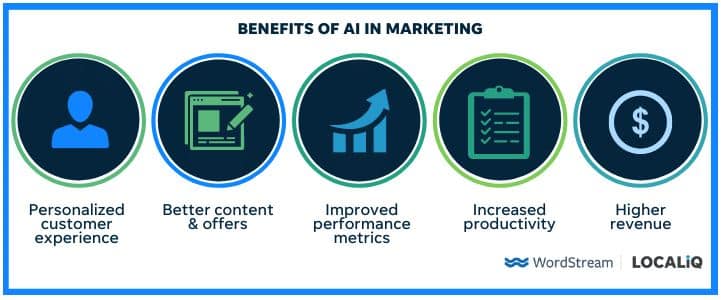
Marketing Examples Utilizing AI
Now that we understand the basics of AI-driven marketing, let’s look at some real-world examples of AI in marketing.
From automation to digital ads, email, and social media, AI is significantly boosting companies’ digital marketing efforts.
Marketing Automation
Tired of manually scheduling social media posts and email campaigns? AI to the rescue!
- AI tools like Acoustic or Drift use machine learning to understand natural language and automate a company’s marketing processes.
- They can track audience engagement data to optimize timing for campaigns.
- AI can even generate subject lines and social posts designed for higher open and clickthrough rates.
This allows marketers to focus on strategy while AI handles the busy work. Set it and forget it!
Digital Marketing
From paid search to display ads, AI is revolutionary for digital marketing in the following ways:
- Machine learning algorithms can rapidly test different ad variations to find the highest-performing combination of creative, headline, etc.
- AI analyzes clicks, conversions, demographics, and more to optimize targeting.
- Dynamic creative optimization uses AI to generate thousands of ad versions for different audiences automatically.
Top sports apparel brand Nike uses AI algorithms to study what shoppers like. The AI looks at what customers bought before and which products they browsed. This helps Nike get to know each person’s style.
Then it takes this intel to serve up personalized product suggestions for each customer. By understanding people’s tastes, Nike can recommend stuff they’ll actually want. This makes for a way better shopping experience.
The best part? The tailored suggestions make it more likely shoppers will grab those personalized picks.
Email Marketing
We all get hundreds of emails, right? AI can cut through the noise to boost engagement for email marketers.
- AI assistants can generate personalized subject lines and content for each subscriber based on past engagement.
- Tools like Boomtrain use machine learning to determine the optimal send times for each person.
- AI analyzes past email marketing campaigns to know which design, content style, etc, works best.
According to Statista, more than 41% of marketers surveyed say the use of artificial intelligence has led to higher revenues from their email marketing campaigns.
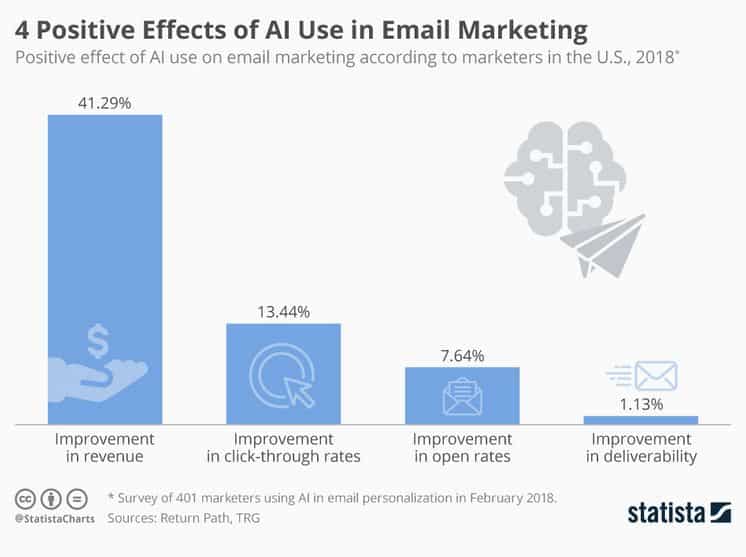
FARFETCH used AI to enhance its brand voice and saw impressive results in its email marketing campaigns. The luxury fashion retail brand recorded an increase of 38% in average click rate and a 31% boost in average open rate from the AI-powered campaigns.
Social Media Marketing
Marketing on social media platforms while managing multiple social accounts is tough. But it becomes easier when brands incorporate AI into their marketing plan.
Here are some of its use cases in social media marketing:
- AI social media management tools like Buffer or Hootsuite suggest content your audience may like and automatically schedule posts.
- Algorithms track which types of content, hashtags, etc, perform best and suggest new ones to try.
- AI can even create original social posts and ads in your brand’s voice. This saves tons of time while connecting with readers.
As you can see, AI is making its way into all facets of marketing. And this is only the beginning! Exciting new applications are emerging daily to improve many businesses’ marketing strategies further.
AI Chatbots and Virtual Assistants
Got a customer question? Let AI chatbots and virtual assistants handle it! Many brands now use conversational AI to enhance customer service. According to Chatbots Magazine, chatbots could help businesses cut customer service costs by 30%.
Retailers like H&M and Sephora implement chatbots to field common product and order queries on their websites. The bots use natural language processing to understand questions and provide helpful information 24/7.
Messaging apps take it a step further. Sephora’s bot on Facebook Messenger can give personalized product recommendations based on past purchases and preferences. Talk about VIP treatment!
Banks like Capital One use AI-powered chatbots within their mobile apps to answer account and payment questions on the go. The bots reduce call volume by handling common requests automatically.
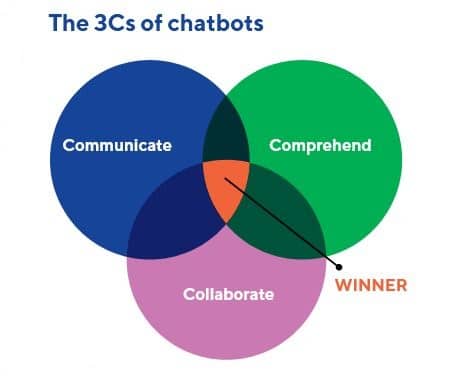
Source: cognizant.com
Virtual assistants with personality keep customers happy while optimizing operations. As AI capabilities grow, more brands are implementing conversational interfaces to enhance the customer journey.
User-friendly bots help to improve customer satisfaction while allowing humans to focus on complex issues. So don’t leave customers hanging – deploy AI chatbots for instant, personalized service with a smile!
AI for Content Creation
One of the most promising uses of AI in marketing is automating content creation:
-
Tools like Copy.ai and Articoolo use natural language generation to create blog posts, social media captions, and more in a brand’s voice. They only require using the right AI prompts. No more writer’s block!
-
Programs like Phrasee generate thousands of subject lines and slogans for optimal marketing performance.
-
Brands like HubSpot and Buzzfeed leverage AI writing assistants to create content drafts, saving time.
The key is combining AI content creation with human expertise for final approval. This collaborative approach makes AI an invaluable asset for any content marketing team.
The possibilities are endless when AI lends its creative skills to the marketing workflow. But it’s important to note it’s only an assistant and not a replacement for human writers.
Using AI in Advertising
AI is transforming advertising in exciting ways. Let’s explore how artificial intelligence is powering a new era of dynamic, hyper-personalized ads.
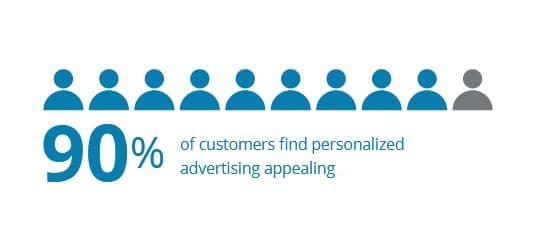
Source: deloitte.com
Defining AI Advertising
What exactly is AI advertising? It refers to ads powered by artificial intelligence technologies where:
-
Machine learning algorithms optimize ad performance.
-
Tools analyze customer data to deliver targeted ads.
-
Personalized ad versions are generated through dynamic creative optimization.
AI advertising allows brands to test countless ad variations to identify what resonates best with each audience. It provides a one-on-one ad experience at scale!
AI Advertising Examples
Many brands have already implemented AI to boost their ads:
-
Coca-Cola uses generative AI to analyze social media and other data to choose the optimal combination of visuals, captions, and more for its digital media ads.
-
Netflix trained machine learning algorithms on past data to improve its Google search ads. The AI now makes bid adjustments in real-time to find the best audiences.
-
Pandora implemented AI to customize audio ads using things like location, weather, and listener preferences.
Clearly, big and small brands will find tremendous value in using AI in advertising.
AI Image Generator
AI can create ads from scratch! AI image generators like DALL-E 2 can produce original images simply based on text prompts.
Want an eye-catching visual for your latest digital campaign? Just describe it in natural language, and AI can generate hundreds of options.
By leveraging artificial intelligence in advertising, brands can scale creativity, optimize performance, and deliver unparalleled personalization. As AI capabilities grow, its role in shaping campaigns will only increase.
Challenges & Considerations in Implementing AI in Marketing
AI opens exciting possibilities in marketing, but effectively integrating it takes planning. Jumping into AI without a strategy rarely pays off. Brands should address these common challenges:
- Having sufficient customer data for AI algorithms to learn from.
- Choosing the right AI applications to focus on first. Start small!
- Integrating AI with existing marketing workflows and platforms.
- Ensuring transparency and ethics in AI use.
- Maintaining control over final creative output and messaging.
- Training marketing teams on getting the most from AI tools.
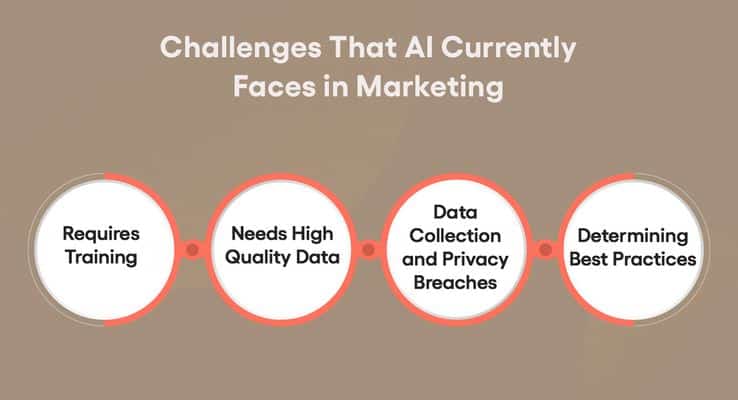
With deliberate planning, many of these hurdles can be overcome by the following:
- Collect first-party data over time to fuel AI insights. Don’t rely only on third-party data.
- Focus initial AI projects on tasks that will demonstrate quick wins.
- Seek AI platforms that integrate seamlessly with current marketing systems.
- Audit algorithms for bias and be responsible stewards of customer data.
- Keep humans involved in the final approval of AI-generated content.
- Appoint internal AI specialists to provide training and support.
AI-Powered Analytics
Making sense of data is every marketer’s dream. With AI analytics, brands can uncover strategic insights that would be impossible to find manually.
Specifically, artificial intelligence enables two game-changing capabilities when applied to marketing data and campaigns. Let’s briefly discuss them below.
Advanced Analytics in Marketing
Traditionally, reporting only shows past performance. AI analytics enable:
- Granular segmentation to identify high-value customer groups
- Predictive modeling to forecast future outcomes
- Prescriptive recommendations to optimize activities
Tools like Datorama use machine learning to surface hidden insights across data sources. Others like Funnel.io combine AI and a drag-and-drop interface for easy data modeling.
With AI, time-consuming manual analysis becomes a thing of the past. Marketers get a strategic bird’s-eye view based on historical trends and real-time data.
For example, Spotify uses AI to analyze metrics on podcast episodes and predict listener engagement. These insights inform content planning and advertising.
Predictive Analytics
One of the most valuable applications of AI is predicting customer behavior:
- Machine learning algorithms study past interactions to determine the likely outcomes of future campaigns.
- AI spots changing trends and patterns early, enabling brands to adapt quickly.
- Tools can even prescribe the optimal messaging and offers for different customer segments.
Predictive analytics empower marketers to look into the future and take proactive actions based on data-driven forecasts.
For instance, US food delivery company DoorDash uses AI technology to forecast food delivery demand in a given area based on past orders, weather, and nearby events. This allows better driver staffing and inventory management.
Make predictive analytics work for your brand. Data holds immense opportunities when analyzed with the power of artificial intelligence.
Customer Journey Mapping and Optimization in AI-driven Marketing
Traditional journey mapping relies on surveys and focus groups to generalize the experience. But each customer journey is unique.
Understanding each individual’s path to purchase is crucial. AI gives brands the power to map and optimize customer journeys like never before. Effective marketing strategies will only get better.
With AI-driven machine learning technology, brands can:
- Analyze large volumes of customer data to identify common steps and pain points.
- Continuously update journey maps to reflect changes over time.
- Predict future behaviors to improve experiences proactively.
- Personalize journeys for customer segments based on attributes and past interactions.
- Receive recommendations to optimize pathways in real-time.
For example, Adidas uses AI applications to analyze customer data from web, app, store, and call center touchpoints. This unified view informs personalized experiences across channels.
Personalization at Scale
Delivering 1:1 personalization profitably requires AI. Traditional methods simply don’t scale due to the following reasons:
- Rules-based approaches are limited to basic segment and scenario definitions.
- A/B testing is time-intensive and still results in a generalized experience.
- Manual personalization efforts get overwhelmed beyond a small user base.
AI systems overcome these hurdles by:
- Analyzing exponentially more data signals to determine customer attributes and intent.
- Dynamically adjusting experiences in real-time based on interactions and changing context.
- Continuously optimizing recommendations as more data comes in.
Starbucks, Netflix, Spotify, Nike, and more use AI to deliver personalized content, marketing offers, pricing, and recommendations at scale. The key is unified cross-channel data.
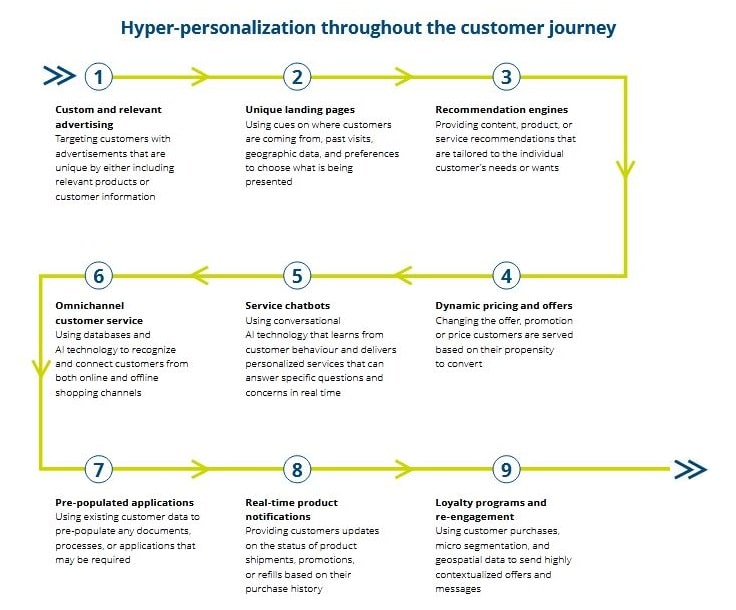
Source: deloitte.com
When built thoughtfully, AI-driven personalization creates magical customer experiences while optimizing business metrics behind the scenes. It’s a win-win situation!
Ethical Considerations in AI Marketing
The incredible potential of AI comes with great responsibility. Brands must make ethics a priority when deploying AI technologies.
Transparency and Accountability
Many consumers are wary of AI’s “black box” nature. As a result of that, brands should:
-
Clearly communicate when and how AI is used in campaigns. Transparency builds trust.
-
Allow opt-outs for data-driven personalization powered by AI.
-
Audit algorithms for unintended bias and ensure diversity in training data.
-
Maintain human oversight and control over AI systems. Automated does not mean autonomous.
-
Develop rigorous testing protocols for new AI applications. Start small before deploying at scale.
-
Share assessments of AI marketing initiatives’ risks and rewards with stakeholders.
-
Assign accountability to internal AI ethics boards governing responsible AI development.
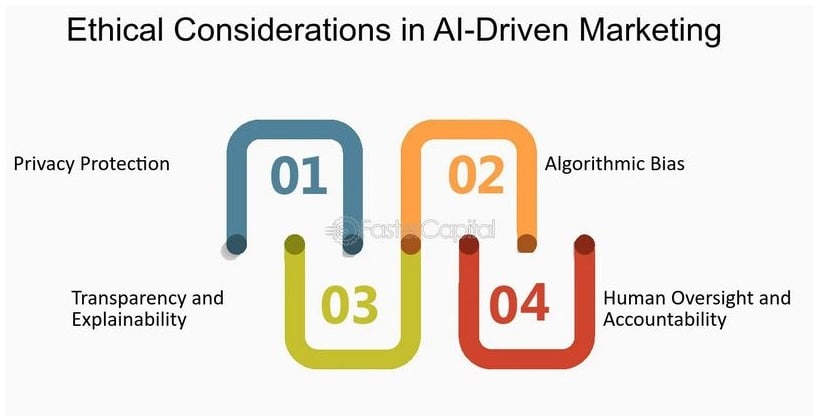
Source: fastercapital.com
With conscientious self-regulation, marketers can harness AI’s potential while addressing ethical concerns.
Data Privacy in AI Marketing
Because AI relies heavily on customer data, brands must:
-
Inform consumers how data is used to train algorithms and personalize experiences.
-
Anonymize or aggregate data to protect privacy in AI applications.
-
Allow customers to delete or retract their data powering AI marketing efforts.
-
Implement strict access controls and encryption to secure data from misuse.
-
Partner only with vetted AI vendors that align with your data privacy standards.
-
Limit data collection to the minimum necessary for delivering value to customers.
Marketing powered by AI holds immense promise. With great innovation comes great responsibility. By upholding strong ethics and transparency, brands build trust while creating happier customers and healthier businesses.
Conclusion
The era of AI in marketing is here. As we’ve seen, leading brands worldwide are already getting awesome results from using artificial intelligence.
From improving customer journeys to making campaigns perform better, AI boosts all parts of marketing. And we’ve just scratched the surface of what it can do. But brands need a strategic approach to tap into AI’s full power.
By focusing on customer needs and being transparent, companies using AI for marketing can build trust while rolling out its innovative uses.
Early adopters of AI for marketing will have a big competitive advantage in connecting with audiences. By embracing this intelligence revolution, businesses can smartly position themselves for long-term success.
Want to connect with your target audience by leveraging AI?
AdvertiseMint can help!
At AdvertiseMint, we use cutting-edge AI tools to run targeted social media ads for our clients. And we’ve delivered great results over the years.
Our ads services can help you scale your business. From tailored ad campaigns to dynamic audience targeting, we will harness the potential of AI to amplify your brand’s reach and impact.
You can get started today by having a consultation with one of our ads experts.
Click on this link to book your FREE Facebook ads consultation now!
